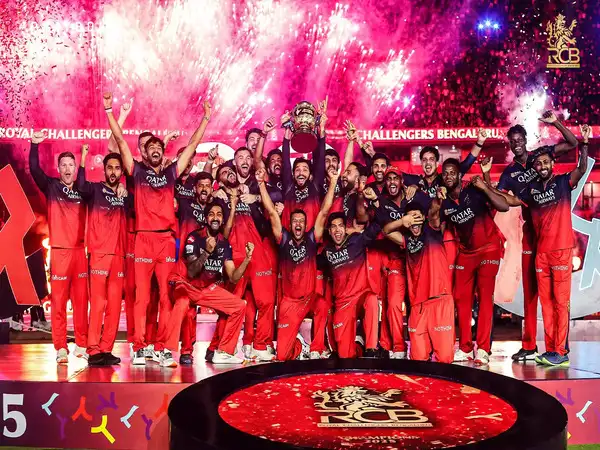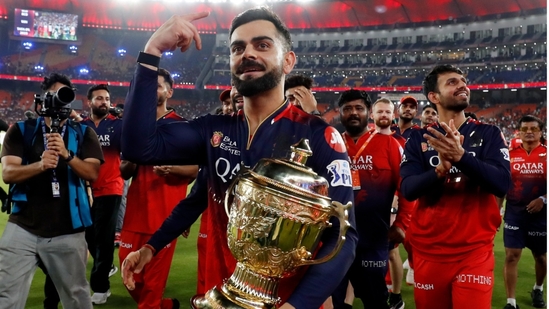After an 18-year drought, a long-awaited trophy finally arrived on Tuesday night with standout performances from Krunal Pandya and Bhuvneshwar Kumar leading the way.
Royal Challengers Bengaluru 190 for 9 (Kohli 43, Arshdeep 3-40, Jamieson 3-48) beat Punjab Kings 184 for 7 (Shashank 61*, Inglis 39, Krunal 2-17, Bhuvneshwar 2-38) by six runs.

Eighteen seasons have passed with fans chanting “Ee sala cup namde” — this year, the cup is ours. Yet, year after year, heartbreak followed. Seventeen campaigns ended in bitter disappointment, and three times, they came agonizingly close, falling short in the finals. For one of the IPL’s most loyal and fervent fan bases, the journey has been an emotional rollercoaster, defined by hope, passion, and resilience.
After 18 Seasons, RCB Finally Clinch Their Maiden IPL Title
It took 18 seasons, but Royal Challengers Bengaluru (RCB) have finally broken their title drought and are now IPL champions.RCB
In their fourth appearance in a final, RCB emerged victorious, defeating Punjab Kings (PBKS), another team still in search of their first trophy. PBKS had captured hearts throughout IPL 2025 with their spirited run, but their fairytale ending wasn’t meant to be—though their moment may yet come.
In a sign of how much T20 cricket has evolved, a match where 190 edged out 184 was still very much a contest dominated by bowlers. After choosing to bowl first, PBKS did well to restrict RCB to 190 on a tricky Ahmedabad surface. But RCB’s bowling unit rose to the occasion. Veterans Krunal Pandya, Bhuvneshwar Kumar, and Yash Dayal—each of whom had previously tasted IPL glory with other franchises—brought their skill, experience, and composure to seal the deal for Bengaluru in a thrilling finale.
The margin of victory was slim—just six runs—which underscored how evenly matched these two teams had been throughout the season. Yet, the result was somewhat misleading. Shashank Singh remained unbeaten with a blazing 61 off 30 balls, finishing the match in style by striking Josh Hazlewood for 6, 4, 6, 6. However, his late fireworks came just a bit too late to change the outcome. PBKS needed 29 runs off the final over, and Hazlewood began with two dot balls that effectively sealed the game, leaving the final blows as mere consolation.

In the end, all eyes turned to one man — the one wearing number 18. Much like his innings in last year’s T20 World Cup final, Virat Kohli’s 43 in this match felt, at times, like a throwback to a different era — too cautious, perhaps, and threatening to leave his team with a sub-par score. Yet, there were signs throughout his stay at the crease that this pitch was far from typical for Ahmedabad this season, where even the lowest first-innings total in eight games had been 196. Kohli found it particularly tough to find power on his pull shots, with PBKS’ seamers extracting tennis-ball-like bounce off the surface when hitting the deck.
A target of 191 felt modest, especially for a PBKS side that had chased down 204 with an over to spare at the same venue just two days earlier. However, the pitch this time told a different story—it didn’t get any easier in the second innings. Two of PBKS’s most promising young batters, Prabhsimran Singh and Nehal Wadhera, managed a combined 41 off 40 balls, slightly bettering Virat Kohli’s labored 43 off 35. Their struggles underlined how challenging the surface truly was.
Krunal has already lifted three IPL trophies with Mumbai Indians (MI), even earning the Player of the Match award in one of those finals — thanks to his performance with the bat.
But this time was different.
Coming in to bat in the 18th over, he managed just 4 runs off 5 balls before holing out. With the bat, his impact was minimal. But with the ball, he changed the game.
The final was hanging in the balance when he was introduced into the attack. Punjab Kings were 52 for 1 at the end of the powerplay — eerily similar to Royal Challengers Bangalore, who had been 55 for 1 at the same point.
Krunal’s first over showcased exactly why he was so tough to score off on this surface. The pitch offered just enough natural variation in pace and turn to make timing tricky, and he used it to full effect. He bowled with good pace, targeting the pitch hard—either darting the ball into the right-handers’ pads to restrict their room or spearing it wide outside off stump, tempting a single to the sweeper cover that they weren’t eager to take. The result was a miserly over, conceding just three runs.
In his next over, Krunal added a new layer to his bowling — the instinct to read the batter’s mind and adjust his pace on the fly. Spotting a desperate charge from the out-of-sorts Prabhsimran, Krunal, who typically operates around 98-101 kph, cleverly pulled the pace back, floating a slow 80 kph delivery wide of the batter’s vision. Prabhsimran, thrown off balance and shape, could only slice the ball awkwardly to point, handing the bowler a reward for his sharp thinking.
Cast your mind back to November 19, 2023. Shreyas Iyer was in scorching form throughout the ODI World Cup and had just delivered a match-defining knock in the semi-final. But in the final, his momentum stalled—he fell cheaply, nicking a back-of-a-length ball behind the stumps.
Fast forward to now, and the pattern repeated itself, almost eerily. Then, it was Pat Cummins; this time, it was Romario Shepherd. Instead of a tentative prod, it was an ambitious cut that went awry—an uncontrolled top edge flying to the fielder. A major turning point once again, leaving PBKS facing an uphill task: 112 needed from just 62 balls.
They were still very much in the contest, thanks to their deep batting lineup and a scintillating knock from Josh Inglis. On a pitch where the short or back-of-a-length deliveries weren’t behaving predictably—neither in pace nor bounce—Inglis seemed unfazed. He was executing the pull shot like a man possessed, timing it to perfection against both pace and spin. Off just 10 pulls, he smashed 33 runs, including one boundary and four towering sixes.
At 39 runs, he tried to step out and loft Krunal over long-on but lacked the power and height to clear the field. With PBKS needing 93 runs off 47 balls at that moment, the game appeared almost beyond reach.
Shashank began his season at the same ground, smashing five boundaries in a now-legendary final over, which left his captain stranded on 97 without the strike.
He finished the innings with another display of brilliance, keeping PBKS barely in the game even as the required run rate soared. In the 16th over, he struck Hazlewood for two towering sixes, bringing the target down to a challenging yet achievable 55 runs from 24 balls.
Table of Contents
With the rest of PBKS’ batsmen and genuine all-rounders already dismissed, Shashank stubbornly refused singles, holding onto the strike throughout the 19th over. Against Bhuvneshwar, he unleashed a six and a four, setting the stage with 29 runs needed from the final six deliveries.
For much of RCB’s innings, it was hard to tell whether they were simply going a bit too slow on a flat pitch or carefully building a solid foundation on a slow one. While Kohli anchored the innings at one end, his top-order teammates kept falling just as they started to look dangerous. Phil Salt, Rajat Patidar, and Liam Livingstone combined for 66 runs off 43 balls, but all three were dismissed by Kyle Jamieson. Jamieson expertly used a slower leg-cutter, either making the ball die unexpectedly off shorter deliveries or dip sharply when he bowled fuller, unsettling the batters each time.
Jamieson, Azmatullah Omarzai, and Vijaykumar Vyshak consistently bowled a challenging hard length, making it difficult for RCB to find attacking options until Jitesh Sharma came to the crease. Jitesh played a crucial cameo, scoring 24 runs off just 10 balls. His innings included a flat-batted six over cover, where he cleverly created room by exposing his stumps, and a scooped six over his head off Jamieson, hit while chest-on to the bowler.
Jitesh’s knock looked set to push RCB past the 200-run mark, but their momentum was halted by Vyshak, who dismissed Jitesh in the 18th over while conceding only five runs. The innings was then wrapped up by Arshdeep Singh, who exploited reverse swing to deliver full, attacking deliveries targeting the stumps in the final over, taking three wickets for just five runs and restricting PBKS effectively.
READ ALSO…….2025 The final is about the emotion and the fire in the tank to win: Dinesh Karthik















 Categories
Categories









